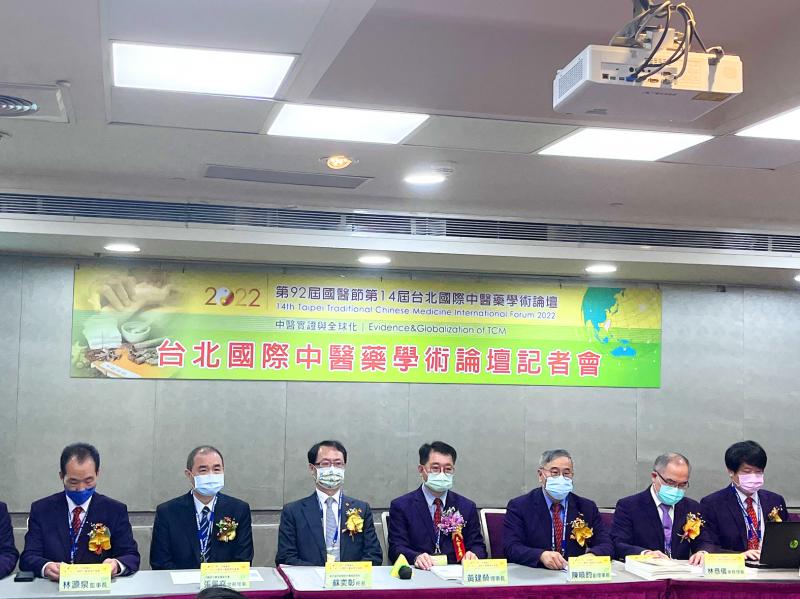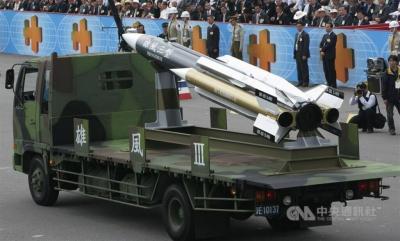A Chinese medicine-based herbal formula developed in Taiwan called Taiwan Chingguan Erhau (清冠二號), or NRICM102, could reduce the mortality rate of COVID-19 cases who experience severe symptoms by 50 percent, National Research Institute of Chinese Medicine (NRICM) director Su Yi-chang (蘇奕彰) said.
Su talked about the treatment on Sunday at the Taipei Traditional Chinese Medicine International Forum, saying that following the success of Taiwan Chingguan Yihau (清冠一號), or NRICM101, the institute is applying for patents and trademarks for the new formulation.
In 2020, permission was granted to export Taiwan Chingguan Yihau, and it has been sold in more than 50 countries with positive responses from overseas, Su said.

Photo: Tsai Si-pei, Taipei Times
Taiwan Chingguan Yihau received emergency use authorization in May last year from the Ministry of Health and Welfare, which allowed it to be manufactured and used for clinical treatment in Taiwan.
Eight pharmaceutical companies have authorization to manufacture the formula.
Taiwan Chingguan Erhau is a modification of its predecessor, which includes indigowoad root, heartleaf houttuynia herb and scutellaria root, among others, Su said.
Ingredients “helpful in fighting viruses” and “regulating the immune system” remain in Taiwan Chingguan Erhau, while stronger substances that “help bolster health maintenance” were substituted for those with modest effects, he added.
Clinical trials of Taiwan Chingguan Yihau were conducted from May to August last year in 15 hospitals including the Tri-Service General Hospital, Taipei Hospital and Taoyuan General Hospital.
Results showed that the chance of people with COVID-19 developing severe symptoms was reduced by 80 percent if they were using the formula, Su said.
Over the same period, more than 100 cases with severe symptoms received Taiwan Chingguan Erhau in clinical trials, with results suggesting a 50 percent drop in mortality rate within 30 days, he said.
Asking pharmaceutical companies to target only COVID-19 cases with severe symptoms is impractical as the pandemic wanes, Su said, adding that the institute plans to test Taiwan Chingguan Erhau’s usefulness against other severe lung diseases.
The formula’s effectiveness in treating chronic obstructive pulmonary disease, cardiac and pulmonary arrest, and pulmonary embolism are being assessed, he said.
Su also said that unlike Western medicines that target one disease, a Chinese medical formula can usually treat many diseases.
Taking Chinese medicine is unlikely to produce side effects or develop resistance the same way drugs or antibiotics do, he said.
Su said that the institute plans to approach companies that are interested in manufacturing Taiwan Chingguan Erhau and follow the procedures for launching new medical treatments in Taiwan.

STATS: Taiwan’s average life expectancy of 80.77 years was lower than that of Japan, Singapore and South Korea, but higher than in China, Malaysia and Indonesia Taiwan’s average life expectancy last year increased to 80.77 years, but was still not back to its pre-COVID-19 pandemic peak of 81.32 years in 2020, the Ministry of the Interior said yesterday. The average life expectancy last year increased the 0.54 years from 2023, the ministry said in a statement. For men and women, the average life expectancy last year was 77.42 years and 84.30 years respectively, up 0.48 years and 0.56 years from the previous year. Taiwan’s average life expectancy peaked at 81.32 years in 2020, as the nation was relatively unaffected by the pandemic that year. The metric

Taiwan High Speed Rail Corp. (THSRC) plans to ease strained capacity during peak hours by introducing new fare rules restricting passengers traveling without reserved seats in 2026, company Chairman Shih Che (史哲) said Wednesday. THSRC needs to tackle its capacity issue because there have been several occasions where passengers holding tickets with reserved seats did not make it onto their train in stations packed with individuals traveling without a reserved seat, Shih told reporters in a joint interview in Taipei. Non-reserved seats allow travelers maximum flexibility, but it has led to issues relating to quality of service and safety concerns, especially during

A magnitude 5.1 earthquake struck Chiayi County at 4:37pm today, the Central Weather Administration (CWA) said. The hypocenter was 36.3km southeast of Chiayi County Hall at a depth of 10.4km, CWA data showed. There were no immediate reports of damage resulting from the quake. The intensity of the quake, which gauges the actual effect of a seismic event, measured 4 in Chiayi County, Tainan and Kaohsiung on Taiwan's seven-tier intensity scale, the data showed. The quake had an intensity of 3 in Chiayi City and Yunlin County, while it was measured as 2 in Pingtung, Taitung, Hualien, Changhua, Nantou and Penghu counties, the data

The Supreme Court today rejected an appeal filed by former Air Force officer Shih Chun-cheng (史濬程), convicted of Chinese Communist Party (CCP) espionage, finalizing his sentence at two years and two months for contravening the National Security Act (國家安全法). His other ruling, a ten-month sentence for an additional contravention, was meanwhile overturned and sent to the Taichung branch of the High Court for retrial, the Supreme Court said today. Prosecutors have been notified as Shih is considered a flight risk. Shih was recruited by Chinese Communist Party (CCP) intelligence officials after his retirement in 2008 and appointed as a supervisor